This section is for paid subscribers only. Our subscription is only $3700/- for one full year.
You get unlimited access to all paid section and features on the website with this subscription.
Subscribe to read full article
This section is for paid subscribers only. Our subscription is only $37/- for one full year.
You get unlimited access to all paid section and features on the website with this subscription.
Not ready for a full subscription?
You can access this article for $2, and have it saved to your account for one year.
- GenreRomance, Drama
- FormatB-W
- LanguageHindi
- Run Time155 mins
- Length4445.50 meters
- Number of Reels16
- Gauge35 mm
- Censor RatingU
- Censor Certificate NumberU-6801/52-MUM
- Certificate Date03/10/1952
Around the popular figure gathers many a legend that often obscure history, if any available. But legend is history, unrecorded, and history; "What is history but fable agreed upon?"
Our story deals with the popular legend of Baiju Bawara.
In order that Tansen, composer of new Ragas and the great singer of Akbar The Great should have complete peace and quietness surrounding him to enable him to meditate and compose new Ragas and since some orthodox musicians were in the habit of disturbing him because of jealousy, Akbar the Emperor established a law that no one should sing round about Tansen's house or haveli as it was in those days called. Anyone who contravened this law was given the chance of proving himself a better musician than Tansen, failing which he had to lose his life; in case of defeat, Tansen would himself place his life at the mercy of the victor. Sentries were posted near Tansen'shaveli to book offenders.
A group of sadhus is passing Tansen's haveli singing bhajans and thus breaking the law, subsequently, a scuffle arises between the sadhus and the sentries. Baiju, our hero, a boy of ten and his father are also among the sadhus. In the scuffle Baiju's father is wounded and at last while breathing his last he takes a promise from Baiju to take revenge on Tansen.
Shankaranand, a kind-hearted musician, enamoured with melodious voice of Baiju takes him to his village and teaches him music. Baiju befriends and eight year old girl of the village, Gauri, whose enticement of friendship and beauty is in itself a great inspiration to the music inborn in him.
TIME MARCHES ON..... The arrows of cupid pierce the heart of Baiju, and Gauri realises the pangs of love in Baiju's heart and loves him inspite of her having been betrothed to one, Narpat, of the village in young age as customary.
All of a sudden, one night, the village is raided by dacoits led by an outlaw, Roopmati, and while the plunder is on, Baiju saves the village by his melodious song. Roopmati enamoured by the music and also Baiju leaves the village taking Baiju with her as ransom and thus Baiju saves the village from plunder.
Baiju learns from Roopmati that she is not a born outlaw but since the village once belonged to her father was forcibly taken away from him and the shock succumbed him she is taking revenge by dacoity and fulfils her promise of revenge to her father. The old thoughts of his own promise to his father come crowding back to Baiju.
Running away from the dacoits with a drawn sword he reaches the haveli of Tansen, and steals himself in the presence of Tansen. Tansen laughs at the rashness of Baiju and tells him that revenge on Tansen can only be achieved with the weapon of music. Determined to fulfil his promise, Baiju now comes to Swami Haridas, Guru of Tansen, who reminds him that music can be mastered only if the thought of revenge is removed.
Dejected and disappointed Baiju spends days and nights in a ruined temple in front of Idol of Bhairavnath and struggles with music. Again he meets Swami Haridas who now accepts him.
Roopmati learns that Baiju has by this time become a disciple of Haridas, brings Gauri to him. Though overjoyed in meeting Gauri, the thought of having forgotten the promise to his dying father in thoughts of love, makes him run away from Gauri, only to be followed by her. Reaching the ruined temple, Gauri begs him to accept her, and not spurn her love. Baiju narrates to Gauri his mission and that he can only keep his promise given to his dying father if he forgets her. Leaving her the meets his Guru Haridasji, who again reminds him, that music can be mastered only if the thought of revenge is removed and in its place love is instilled.
Inspired by this teaching Baiju rushes back to Gauri and finds her in semi-conscious state and a cobra creeping by her side. Seeing Baiju she says "I intentionally remove myself from you, in order that you may become the greatest musician of the world, triumph over Tansen and thus fulfil your promise", and loses her conscience. Baiju thinks Gauri dead and loses his mental equilibrium. He is now a "Bawara" - a lunatic in the real sense of the term. Roopmati who comes in search of them, finding Gauri lying unconscious, removes her from immediate attention to save her life.
Meanwhile Baiju has returned to the temple and weeps before the Idol. An intense pathetic song comes on his lips and his voice thunders with burning emotion that even moves the Idol of stone to tears.
Singing on, Baiju the Bawara wanders and ultimately reaches near Tansen's haveli. As a lost lunatic he goes on singing and people nearby are surprised since it amounts to breaking law. Ghasit Khan, an old musician, jealous of Tansen is very happy and he claims Baiju as his disciple. The sentries at Tansen's haveli stop him singing and arrest both Baijuan Ghasit Khan, the alleged 'Ustad'.
While in the jail, Ghasit Khan persuades Baiju to compete and win over Tansen otherwise both of them would be hanged. Here Roopmati breaks in an informsBaiju that Gauri is alive and is longing for the day when Baiju would triumph over Tansen. Inspired by this Baiju regains his self and is prepared to challenge Tansen and takes part in the combat of music.
In the village, Mohan, father of Gauri loses all hopes of Baiju's return and fixes the marriage of Gauri with Narpat and the preparation of the marriage ceremony starts.
In Agra the day of competition has come. The court is assembled. The Emperor and his Ratnas, the courtiers, ministers, and the citizens rich and poor gather together.
How the songs of the two great masters of music; what happens in the competition - who wins - what happens to Gauri, Baiju's beloved and his sole inspiration now adorned in a bridal veil? All these will be seen on the silver screen.
(From the official press booklet)
Cast
-
Meena Kumari
Gauri -
Bharat Bhushan
Baiju
Crew
-
BannerPrakash Pict, Bombay
-
Director
-
Music Director
-
Lyricist
-
Story Writer
-
Dialogues
-
Cinematography
-
Editing
-
Art Director/Production Design
-
Choreography
-
Costumes
-
Make-up
-
Laboratory/ Processed atBombay Film Lab. P. Ltd
-
Music CompanyH M V
-
Song Recording






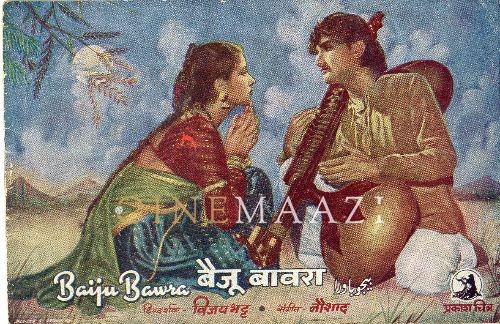
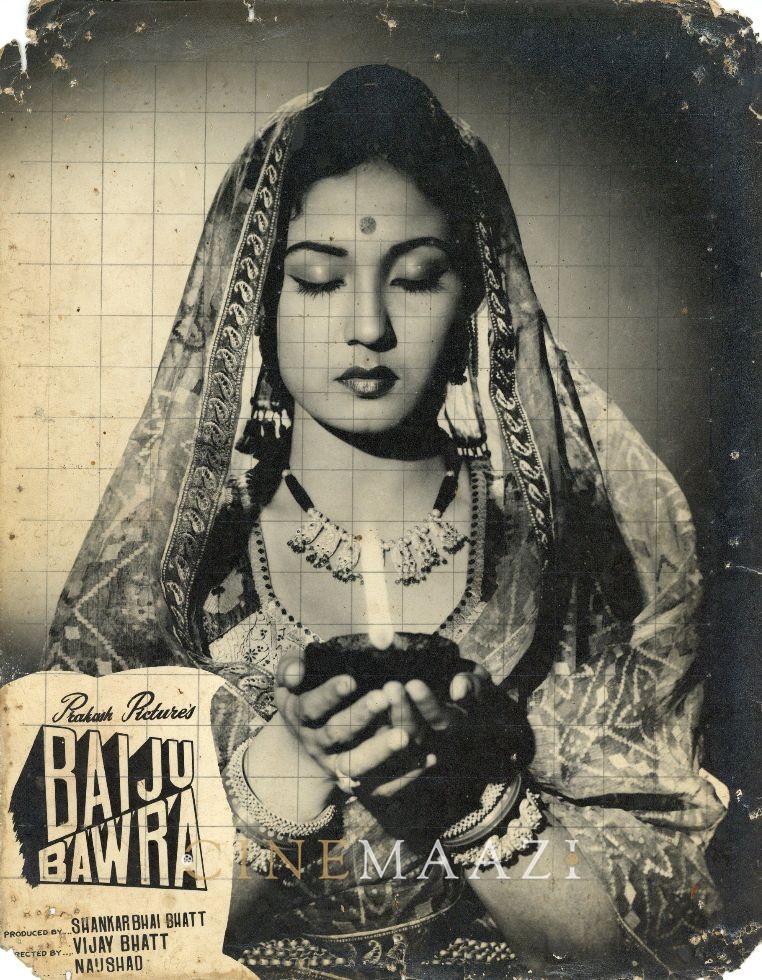
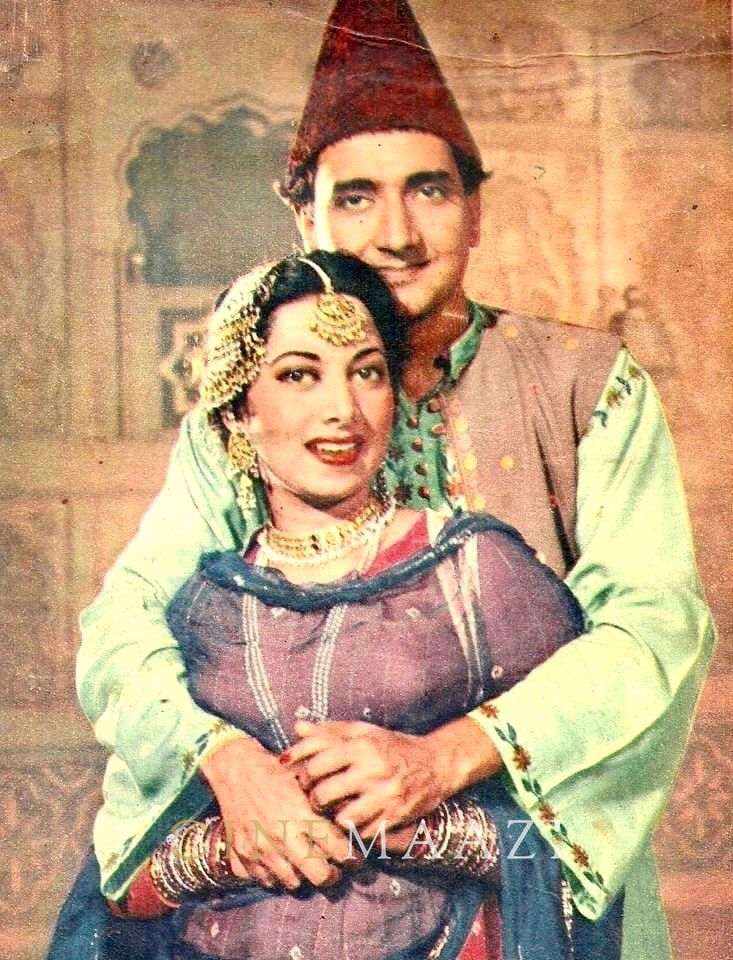
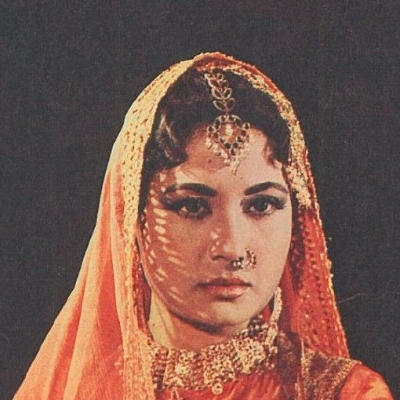



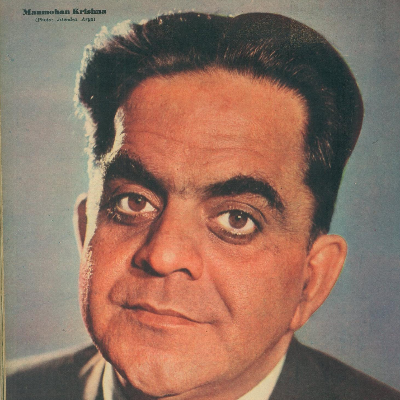
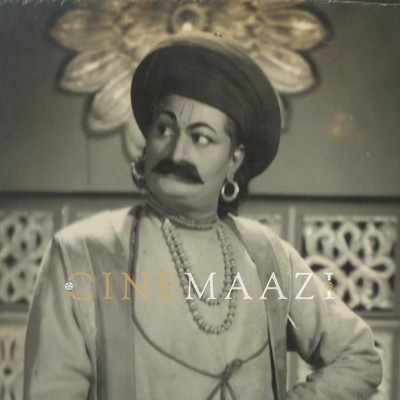


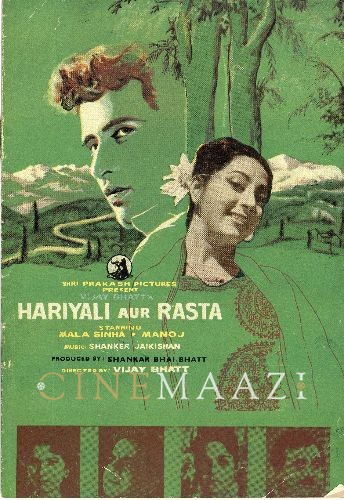
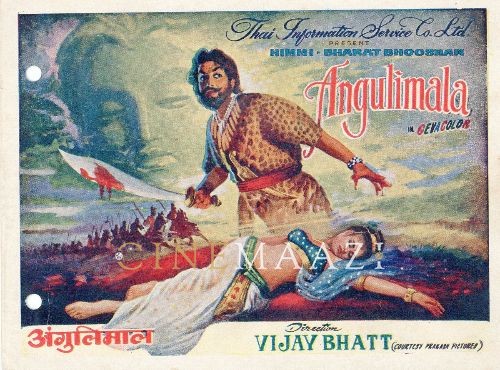

.jpg)



